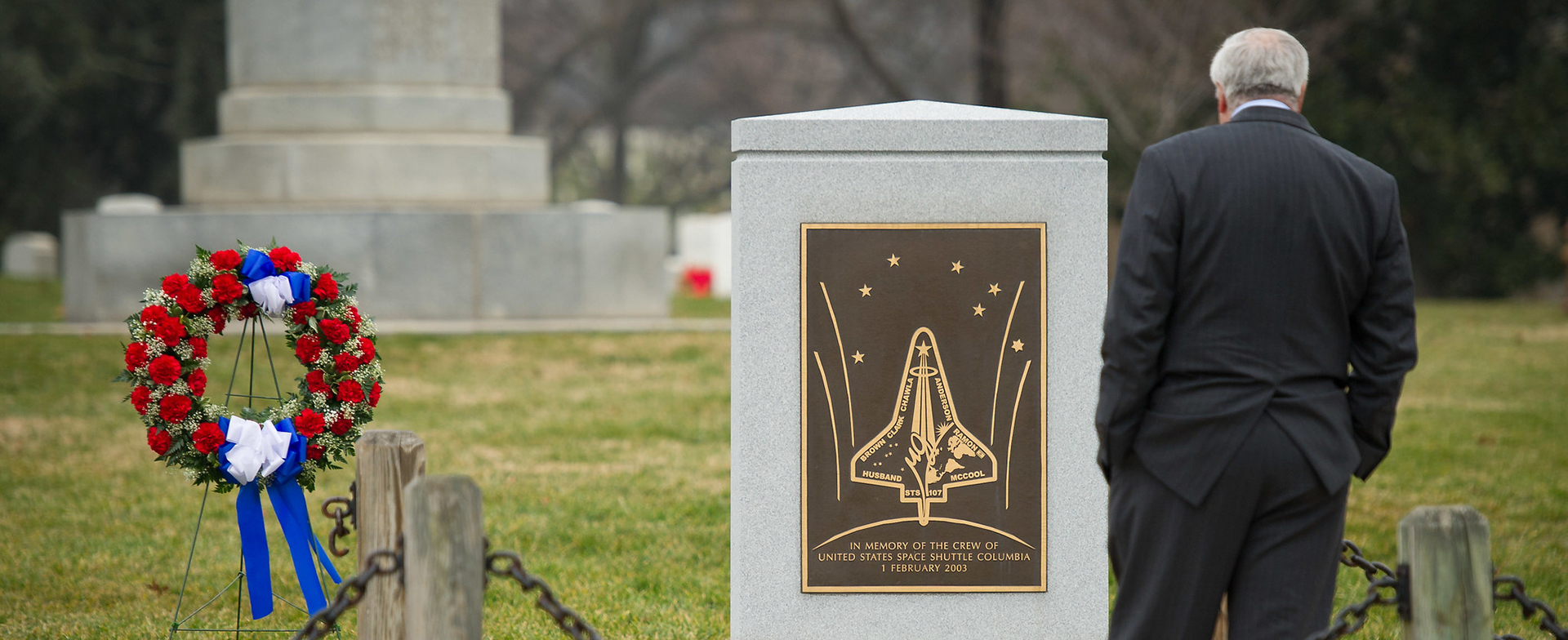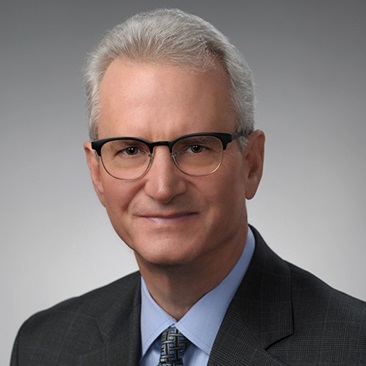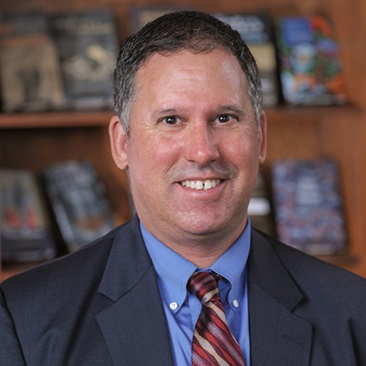
On Tragedy’s Anniversary, Former NASA Leader Sean O’Keefe Reflects on the ‘Price of Diligence’
January 31, 2023
O’Keefe, a Maxwell School alumnus and Syracuse University Professor, was at the helm 20 years ago when Columbia broke apart while returning from a space research mission.
The Columbia shuttle was scheduled to land at the John F. Kennedy Space Center in Cape Canaveral, Florida, on the morning of Feb. 1, 2003, after completing a successful 16-day research mission.
Joining the families of the ship’s seven-member crew on the tarmac that morning was alumnus Sean O’Keefe ’78 M.P.A. He was the head of NASA at the time, and says the excitement was palpable.
The first orbiter to fly in space with its maiden voyage in 1981, Columbia had drawn international attention for its 28th mission. It brought a sense of optimism following the 9/11 terrorist attacks, and its crew included the first Israeli astronaut.

The landing countdown, which began just before 9 a.m., did not end with the tell-tale sonic booms—made when a shuttle crosses the sound barrier on its return to earth. “The shuttle was on track to land, but the time came and went, and everybody knew this was not normal,” O’Keefe remembers. “The mood turned from excitement to confusion.”
O’Keefe and others gathered on the landing strip did not know that debris from the shuttle had already begun to rain down across a 200-mile stretch of Texas and Louisiana.
On Wednesday, Feb. 1, 2023, O’Keefe will visit the remote town of Hemphill, Texas, where the Columbia crew was recovered. He will join community members and families of the fallen astronauts for a ceremony marking the tragedy’s 20th anniversary.
“These are heroic people who’ve shown remarkable resolve and courage in the midst of this despair,” he says.
Last week—on Thursday, Jan. 26—O’Keefe gave remarks at NASA’s annual Day of Remembrance ceremony at the Johnson Space Center in Houston, about 200 miles southwest. Events held the same day at other NASA sites and at Arlington National Cemetery honored Columbia’s fallen and the astronauts who died in the Apollo 1 and Challenger accidents, in 1967 and 1986, respectively.
Most years, O’Keefe attends the remembrance ceremony in Arlington, the final resting place for three Columbia astronauts and home to the Space Shuttle Columbia Memorial. “It always brings back every memory of the day,” he says. “It reminds me why we are responsible for this tragedy. And it provides an occasion to reflect on the experiences.”
So does his work as University Professor and Phanstiel Chair in Leadership at Syracuse University.
‘I don’t hold a lot back’
The Columbia tragedy is part of Sean O’Keefe’s lesson plan at Syracuse University’s Maxwell School of Citizenship and Public Affairs. A University Professor since 2014, he teaches graduate courses in the Public Administration and International Affairs (PAIA) Department. He’s also engaged in Maxwell’s Washington, D.C., programs at the Center for Strategic and International Studies, a think tank where he is a distinguished senior advisor.
“I don’t hold a lot back,” he says of his teaching about the experience. While reliving the tragedy takes a toll, he says it is important, and it “starts with the proposition that on that day we failed.” He adds, “Personally, I failed as a leader to have caught or understood the management dimensions that caused this to happen.”
Columbia’s accident was caused by a breach in its left wing inflicted during liftoff by a breakaway chunk of foam insulation. But in its 2003 report, the Columbia Accident Investigation Board cited NASA’s culture as having a contributing role.
That culture was established well before O’Keefe took the helm in late 2001, says O’Keefe’s Maxwell colleague, W. Henry Lambright, professor of political science and public administration and international affairs and director of the Science and Technology Policy Program in the Center for Environmental Policy and Administration. Lambright served as a consultant in the Columbia investigation and has written books and numerous articles about his NASA research.
“The Columbia report says essentially that the accident is rooted in history,” he says, adding that a sense of complacency had gradually arisen from NASA’s previous successes. That was worsened by an atmosphere in which concerns were not aired to the highest levels of management—a common organizational challenge, he adds.
“Creating a culture where people are not threatened or defensive, where they feel safe to share divergent views or challenges, is hard in an organization of very prideful, resolute people,” says Lambright.
Therein lies one of the most important lessons O’Keefe strives to impart on students: The critical role of organizational dynamics. “If you create a culture that doesn’t particularly tolerate objection or different points of view, it could kill somebody,” he says.
His students also hear lessons about accountability, risk management and crisis response. His invited guest lecturers have included astronauts and other insiders like Michael Lienbach, the former launch director of the space shuttle program at the Kennedy Space Center who played a key role in the Columbia search and recovery effort.

What impacts students the most: O’Keefe’s memories of Columbia’s astronauts.
Commander Rick Husband, a married father of two, was an accomplished U.S. Air Force fighter pilot, astronaut and man of faith. Moments before launch on Jan. 16, 2003, he said, “The Lord has blessed us with a beautiful day here. We appreciate all of the hard work everyone has put into this, and we are ready to go.”
In addition to Husband, the crew included Lt. Air Force Col. and payload commander Michael Anderson; Navy commander and pilot William McCool; payload specialist IIan Ramon—the first Israeli astronaut; and mission specialists David Brown, Kalpana Chawla and Laurel Clark. Clark and Brown were doctors in the Navy; Chawla was an engineer.
Ramon “could charm a crowd in two seconds,” remembers O’Keefe.
Chawla had emigrated from India. “She was quite a role model, especially among women,” says O’Keefe. He recalls her small stature and the fact that her assignment on the mission was to operate a “massive” robotic arm to lift payloads from the shuttle cargo bay.
When sharing such details, O’Keefe says there’s “always a moment in which students realize it’s not some conceptual argument—it’s not a theory that has been made example of. These were real people.”
He adds, “The very least I owe those seven astronauts is to continually remind people of the price of diligence and as a public servant the responsibility of those who are taking risks on the public’s behalf.”
“The very least I owe those seven astronauts is to continually remind people of the price of diligence and as a public servant the responsibility of those who are taking risks on the public’s behalf.”
Sean O’Keefe ’78 M.P.A., University Professor
‘Lucky to have him’
Appointed by President George W. Bush, Sean O’Keefe’s first charge at NASA was to eliminate a $5 billion cost overrun in the construction of the international space station.
“His first year at NASA was largely focused on straightening out its finances,” says W. Henry Lambright, professor and NASA researcher.
The Columbia accident happened just over a year into O’Keefe’s tenure. Lambright credits him with providing steady leadership in the months that followed.
“There’s no preparation anyone can really have for an actual accident that takes lives,” he says. “It was to his credit that he kept his composure and followed the operating procedure. He was dealing with the media, his own organization, holding meetings with the president, and trying to find out what went wrong—and he was also spending a lot of time with the families.”
Among O’Keefe’s most notable accomplishments, says Lambright, is getting the president’s subsequent endorsement of his plan to return to space with a renewed focus on safety. He also celebrated the spacecraft Cassini's exploration of Saturn, and the landing of the Mars exploration rovers Spirit and Opportunity.
Back at Syracuse, O’Keefe’s students have benefitted not only from his candid NASA accounts, but also his willingness to share other leadership experiences. He was a presidential appointee four times—his roles before NASA included comptroller for the U.S. Department of Defense, secretary of the Navy and deputy director of the U.S. Office of Management and Budget. After leaving NASA in early 2005, he served as chancellor of Louisiana State University, vice president of the General Electric Co. and chief executive officer of the Airbus Group, Inc.
Students have heard his account of what it was like to have been in a meeting with Vice President Dick Cheney when the first plane struck the Twin Towers on 9/11.

“There’s no way you can get out of a textbook what he offers—what it feels like to be in charge of a very complicated organization made up of very dedicated and prideful people,” says Lambright. “If you’re willing to listen to someone who has been there and dealt with big issues, you can gain an awful lot.”
Maxwell School Dean David M. Van Slyke echoes the sentiment. “Sean's willingness to discuss the challenges of leadership with both humility and candor make him a forceful presence in the classroom and a favorite among his students," he says.
Van Slyke serves as the Louis A. Bantle Professor of Business and Government Policy, a position held by O’Keefe when he first taught at Maxwell in the years leading up to his NASA appointment. At the time, O’Keefe was also founding director of Maxwell’s National Security Studies Program. When he returned in 2014, he became the 17th faculty member at Syracuse to receive the prestigious appointment of University Professor and he was concurrently named Phanstiel Chair at Maxwell. He also serves on the board of Syracuse’s D’Aniello Institute for Veterans and Military Families.
In addition to his own classes, O’Keefe also frequently gives his time as a guest presenter across the University’s schools and colleges. He shares his experiences with aerospace engineering students at the College of Engineering and Computer Science and regularly speaks with students in the defense comptrollership program offered by the Martin J. Whitman School of Management in partnership with Maxwell.
Back at Maxwell, he gives a talk each semester to students in the Leadership and Public Policy course taught by faculty colleagues Robert Murrett and Catherine Gerard.
“These are students who are about one month from graduation in our M.P.A. program,” explains Murrett, professor of practice of public administration and international affairs. “It’s very important for them to hear from leaders who have been tested, and to hear what they learned from it.”
At the end of the semester, students are asked to write a reflective paper. “Most all of them mention Sean O’Keefe’s talk as one of the highlights,” says Murrett. “We’re very lucky to have him.”
For the Families
Sean O’Keefe’s dedication to the legacy of Columbia’s fallen is fueled by an earlier NASA tragedy and by the example set by the president.
Early in his tenure, O’Keefe learned that the astronauts who died in the Challenger shuttle explosion—including teacher Christa McAuliffe—had not posthumously received the Congressional Space Medal of Honor for which they’d been nominated years earlier. Their families were largely estranged from NASA.
O’Keefe invited them to meet with him and receive the long overdue space medals—ironically, just days after Columbia’s liftoff. The gathering started with an apology.
The somber meeting left a “searing impression,” he says. “They had been largely left on their own to work through the emotional trauma of this tragedy.”
He thought of them, just over a week later, when it became clear that Columbia was not coming home.

“Within minutes, we gathered the astronauts’ families and transported them to an isolated area where they stayed for the bulk of that emotional day until we were able to fly them all home to Houston to be escorted back to their homes,” he recalls.
O’Keefe spoke with then-President George W. Bush that morning. “The very first thing he asked me when I called him a half hour after the accident happened, was, ‘Where are the families?’” says O’Keefe. “We spent a lot of time talking about all kinds of things in the weeks and months that followed, but to him there was never anything that rose to a higher level than how the families were being cared for.”
O’Keefe also considers a conversation he had with Evelyn Husband, widow of Columbia Commander Rick Husband. “She left me with the clear understanding that NASA’s job was to go find out what happened, go fix it and rededicate ourselves to the mission of exploration that they gave their lives to,” he says.
She and other family members of Columbia’s fallen wanted assurance that their loss had meaning—"that something was derived from the horrible tragedy,” says O’Keefe. “I made it a point for them to know we were going to treat it that way. We owed them that diligence. They got the message that we were going to be with them every step of the way.”
By Jessica Youngman
Published in the Spring 2023 issue of the Maxwell Perspective
Related Story:
University Professor Sean O'Keefe '78 M.P.A. was inducted into the Government Hall of Fame in April 2023.
Related News
Commentary

Mar 27, 2025
Research

Mar 25, 2025
Commentary

Mar 24, 2025
